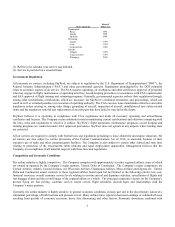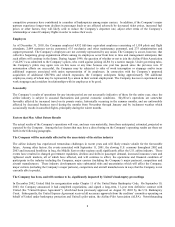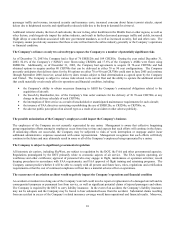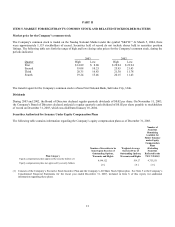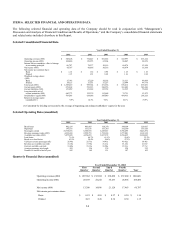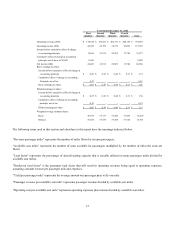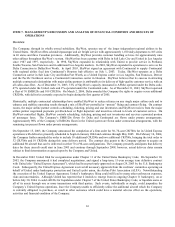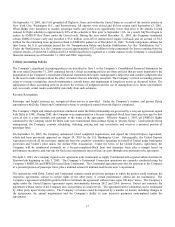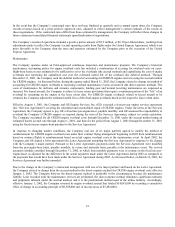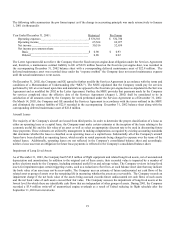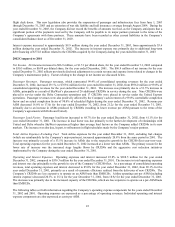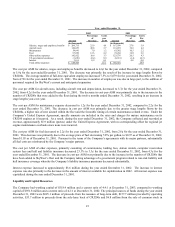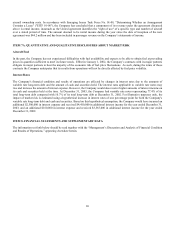SkyWest Airlines 2003 Annual Report Download - page 20
Download and view the complete annual report
Please find page 20 of the 2003 SkyWest Airlines annual report below. You can navigate through the pages in the report by either clicking on the pages listed below, or by using the keyword search tool below to find specific information within the annual report.On September 11, 2001, the FAA grounded all flights to, from, and within the United States as a result of the terrorist attacks in
New York City, Washington D.C., and Pennsylvania. All airports were closed and did not reopen until September 13, 2001.
When flights were permitted to resume, passenger traffic and yields were significantly lower than prior to the attacks. United
reduced its flight schedule to approximately 80% of the schedule it flew prior to September 11th. As a result, SkyWest began to
reduce its EMB120 fleet flown under the United code. During the year ended December 31, 2001, the Company terminated
certain EMB120 leases early and recorded a $3.4 million write-off of unamortized engine overhauls and an accrual of $1.2
million for the remaining lease payments related to EMB120s parked as of December 31, 2001. To help compensate airlines for
their losses, the U.S. government passed the Air Transportation Safety and System Stabilization Act (the “Stabilization Act”).
Under the Stabilization Act, the Company received approximately $12.6 million to help compensate for losses resulting from the
terrorist attacks, of which $8.2 million and $1.4 million had been recognized as a contra expense in the Company’s consolidated
financial statements as of December 31, 2001 and 2002, respectively.
Critical Accounting Policies
The Company’s significant accounting policies are described in Note 1 to the Company’s Consolidated Financial Statements for
the year ended December 31, 2003 contained herein. Critical accounting policies are those policies that are most important to the
preparation of the Company’s consolidated financial statements and require management’s subjective and complex judgments due
to the need to make estimates about the effect of matters that are inherently uncertain. The Company’s critical accounting policies
relate to revenue recognition, aircraft maintenance, aircraft leases and impairment of long-lived assets as discussed below. The
application of these accounting policies involves the exercise of judgment and the use of assumptions as to future uncertainties
and, as a result, actual results could differ materially from such estimates.
Revenue Recognition
Passenger and freight revenues are recognized when service is provided. Under the Company’s contract and prorate flying
agreements with Delta, United and Continental revenue is considered earned when the flight is completed.
The Company’s flight and related operations conducted under the Delta relationship are governed by a ten-year agreement signed
with Delta in 1998. During 2003, the Company was compensated on a fee-per-completed-block hour basis plus true-ups for fuel
costs as this is a pass through cost pursuant to the terms of the agreement. Effective August 1, 2003, all EMB120 flights
conducted by the Company under the Delta code were transitioned from contract flying to “prorate flying”. Under prorate flying
arrangement, the Company controls scheduling, ticketing, pricing and seat inventories and receives a prorated portion of
passenger fares.
On September 10, 2003, the Company announced it had completed negotiations, and signed the United Express Agreement,
which had been previously approved on August 29, 2003 by the U.S. Bankruptcy Court. Subsequently, the United Express
Agreement received all the necessary approvals from the creditors’ committee operating on behalf of United under bankruptcy
protection and United’s pilot union, the Airline Pilot Association. Under the terms of the United Express Agreement, the
Company will be reimbursed primarily on a fee-per-completed-block hour and departure basis plus a margin based on
performance incentives, and true-ups for fuel costs and property taxes as these are pass through costs pursuant to the agreement.
On April 3, 2003, the Company signed a new agreement with Continental to supply Continental with regional airline feed into its
Houston hub beginning on July 1, 2003. The Company’s Continental Connection operations are currently conducted using the
Company’s EMB120s and EMB120s leased from Continental. The Continental agreement provides for payment to the Company
of a prorated portion of passenger fares, plus a minimal amount if minimal load factors aren’t experienced.
The agreements with Delta, United and Continental contain certain provisions pursuant to which the parties could terminate the
respective agreements, subject to certain rights of the other party, if certain performance criteria are not maintained. The
Company’s agreement with Delta permits Delta to terminate the agreement without cause upon 180 days’ notice. The Company’s
rights under the United Express Agreement expire incrementally between 2012 and 2016; however, United can terminate the
agreement without notice if the Company does not perform at certain levels. The agreement with Continental can be terminated
by either party upon 90 days notice. The Company’s revenues could be impacted by a number of factors, including changes to
the agreements, the annual negotiations and the Company’s ability to earn incentive payments contemplated under the
agreements.
17


